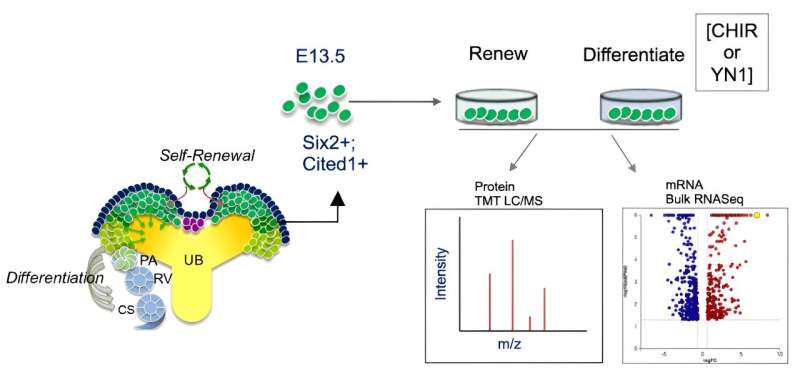This article has been reviewed according to Science X's editorial process and policies. Editors have highlighted the following attributes while ensuring the content's credibility:
fact-checked
trusted source
proofread
Newborns with improper kidney development face lifelong challenges: New study offers potential solution

Some infants are born with too few nephrons, the filtering units in kidneys that help the body remove waste and excess fluid. Whether due to low birth weight, maternal diabetes, inadequate nutrition or genetic mutations, babies born with improper kidney development are more likely to face a lifetime of challenges such as high blood pressure and chronic kidney disease.
A study from Tulane University, published in Nature Communications, has identified a molecule necessary for proper kidney development and a supplement that may potentially ensure proper kidney growth in developing fetuses.
The study found that acetyl-CoA, a sugar-derived molecule created when the body breaks down glucose, is pivotal for the development of nephron progenitor cells (NPCs), "kidney stem cells" that create nephrons. Without enough acetyl-CoA, too few nephrons are produced and the kidneys develop abnormally.
"This intricate mechanism regulates kidney development and ensures that mothers will deliver healthy babies, who will develop into healthy adults," said Gio Tortelote, Ph.D., corresponding author and assistant professor in Tulane University School of Medicine's Department of Pediatrics. "This knowledge can help craft new public health guidelines and therapies aimed at securing proper fetal development."
Chronic kidney disease—defined as having an insufficient number of functioning nephrons—affects approximately 30 million adult Americans. High blood pressure, the leading preventable risk factor for premature deaths worldwide, can also develop when kidneys fail to function properly.
Despite faulty kidney formation being directly linked to hypertension in adulthood, the causes have largely remained unknown. Previous research focused on genetic factors, but this study highlighted the importance of cell metabolism and adequate maternal nutrition.
"Chronic kidney disease affects 15% of U.S. adults and high blood pressure affects approximately 35%," Tortelote said. "Identifying substances that affect fetal development holds significant societal importance."
The research found that supplementation of sodium acetate in pregnant mothers may boost fetal nephron development. Sodium acetate is converted to acetyl-CoA once inside cells. In a mouse model, the study confirmed that sodium acetate increased the pool of NPCs.
Pre-clinical studies are needed to confirm whether sodium acetate can be a viable supplement for pregnant mothers. Additional research is also needed to better understand how cell metabolism can influence gene function during kidney development.
"This knowledge can directly translate into actionable measures to counteract abnormal fetal development and reduce health risks later in life," Tortelote said.
More information: Fabiola Diniz et al, Acetyl-CoA is a key molecule for nephron progenitor cell pool maintenance, Nature Communications (2023). DOI: 10.1038/s41467-023-43513-7




















